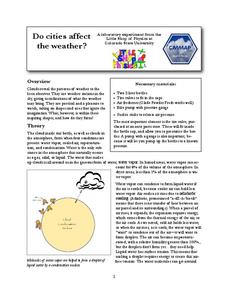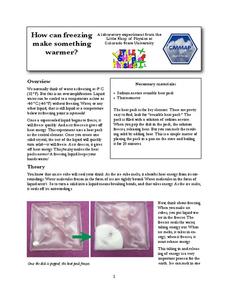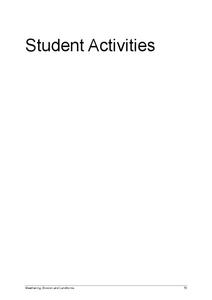Colorado State University
Can it Really Rain Fish and Frogs?
You've heard of it raining cats and dogs ... but what about fish and frogs? It turns out, one scenario is much more likely than the other! Intrepid weather investigators examine the curious behavior of waterspouts using a leaf blower,...
Colorado State University
Can Boiling Make Something Freeze?
Use boiling as an avenue for freezing. Young scholars watch as liquid nitrogen removes heat from the ingredients for ice cream. As this happens, the nitrogen boils and the ice cream freezes—all in the same container. A little science magic!
It's About Time
Making Waves
Young scientists use Slinkys to better understand waves. After creating and measuring many aspects of waves, they complete a handout and homework questions. The resource also introduces the final project for the chapter, though it does...
Re Energy
Build Your Own Biogas Generator
What is biogas and how is it made? After examining background information about the sources of biogas and biogas generators, class members follow the provided information and build a biogas generator that can be used in the classroom.
Teach Engineering
Chromatography Lab
Groups use alcohol and chromatography paper to separate the color components of black ink. The purpose of the activity is to allow the class to become aware that mixtures exist in hidden places.
NASA
S’COOL Cloud Identification Chart
If you've ever wondered why clouds sometimes look so different, look no further than a classroom poster about cloud identification. It features pictures of clouds at high, mid, and low levels of altitude, as well as the name of each and...
Colorado State University
Do Cities Affect the Weather? (Making a Cloud in a Bottle)
The dynamics of a city can have a drastic effect on the weather. A hands-on lesson asks learners to build a model to illustrate how city pollution provides a nucleus for condensation. The greater the pollution, the greater chance for...
It's About Time
Energy Flow in Ecosystems
Emerging biochemists more fully understand the flow of energy in ecosystems as they explore the laws of thermodynamics and relate them to energy transfer in food chains. They also investigate heat loss from the human body and how...
It's About Time
Elements and Their Properties
How did ancient scientists classify elements? Answer this question and others as young chemists create a device to test the properties of various elements. They classify elements as metals or nonmetals, learn to differentiate between...
It's About Time
Solutions, Suspensions, and Colloids
Chemists are frequently in suspension, but not because they misbehave! Scholars mix various items with water to create solutions, suspensions, and colloids. They test each one to determine their differences and properties. The resource...
Curated OER
Weathering Lab
Assist your middle school class with one of the most inclusive weathering and erosion labs available. Individuals use sugar cubes and alka-seltzer to demonstrate the process of physical and chemical weathering. They sketch results...
Royal Society of Chemistry
A Cartesian Diver—Classic Chemistry Experiments
Sometimes the simplest experiments leave the biggest impression! Introduce young chemists to the Cartesian Diver by having them make one of their own. Use the Diver to further their study of liquids and gases, as well as compression.
Colorado State University
How Can Freezing Make Something Warmer?
Crazy fact—freezing liquid actually gives off heat! Young scholars investigate the transfer of energy when liquids freeze using a chemical heat pack. The heat pack gives off heat as its liquid core freezes.
It's About Time
Is It Heredity or the Environment?
Himalayan rabbits are black when raised at low temperatures and white when raised at high temperatures. Young biologists participate in an experiment using seeds to demonstrate the ways the environment can influence an inherited...
National Institute of Open Schooling
Solutions
Aqua regia, or royal water in Latin, is a solvent that can dissolve solid gold and platinum into a solution. Activity nine in a series of 36 allows classes to learn, through readings and answering questions, what a solution is and the...
It's About Time
Sounds from Vibrating Air
Take note, or notes, as the case may be. A scientific music lesson is the third in a set of eight covering waves and instruments. Scholars use straws, test tubes, and water to create various wind instruments. Then, they read and answer...
It's About Time
Inferences of Waves
Building on the previous lesson, scholars use Slinkies to create standing waves. They graph waves on a calculator and then apply their knowledge to both sound and light waves. This is the fourth in a series of nine lessons.
Cloud Front
Weathering, Erosion, and Landforms—Student Activities
Tired of your students taking you for granite? Use a unit that offers multiple hands-on weathering and erosion labs and interactive activities. Some of the exciting lessons include planning a tour of Australia, using ice to break glass,...
It's About Time
Chemistry and Physical Changes
Engage the class like never before as pupils learn to differentiate between multiple physical and chemical changes by conducting a list of small experiments, most often with household materials. They make observations and discuss the...
National Institute of Open Schooling
Chemical Arithmetics
Substances with the same empirical and molecular formula must be differentiated by their structural formula. Part two in a series of 36 has pupils using chemical formulas to calculate how much of a compound is present in a given...
Royal Society of Chemistry
A Solid-Solid Reaction between Lead Nitrate and Potassium Iodide
Why is it so difficult to make two solid compounds react? Investigate the concepts of particle collisions and rate of reaction using a quick demonstration. The colorful experiment features two plain, white solids combining to form a...
Teach Engineering
Density Column Lab - Part 1
Mass and density — aren't they the same thing? This activity has groups use balance beams and water displacement to measure several objects. The pupils use the measurements to calculate the density of the objects.
It's About Time
Volcanos and the Atmosphere
In the summer of 1815, snow fell every month in New England. Was this related to the volcanic eruption of Tambora in Indonesia earlier in the year? Young scientists design their own experiments to research the long-term effect a volcanic...
DiscoverE
Electrical Liquids
Liquid or not, here comes the electricity. Scholars test the conductivity of various substances using a circuit that includes a light bulb. If the light bulb lights up, then the liquid is a conductor. What a bright idea!

























